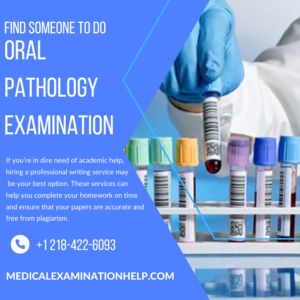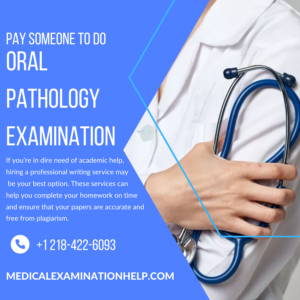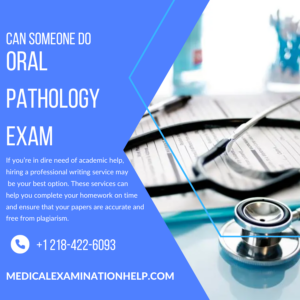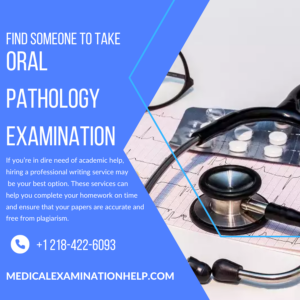
 Oral pathology is the study, identification and diagnosis of diseases affecting the mouth, tongue, throat, gums, salivary glands, jaws and facial muscles. This is a branch of dentistry and a sub-specialty of pathology.
Oral pathology is the study, identification and diagnosis of diseases affecting the mouth, tongue, throat, gums, salivary glands, jaws and facial muscles. This is a branch of dentistry and a sub-specialty of pathology.
Biopsies are a routine procedure if your dentist suspects an abnormality in the oral tissue. They can be performed in the office with Pay Someone To Take Medical a simple local anesthetic.
The oral pathology examination is an important part of a patient’s dental treatment. During this exam, doctors look for abnormalities that can cause serious diseases in the mouth, including cysts, precancerous and cancerous lesions, tumors, and more. They also identify the causes of these diseases, such as bacterial or fungal infections, to help patients treat them.
When a doctor notices an unusual change in the gums, teeth, tongue, or throat, they may need to perform a biopsy to determine the cause. This can be a painful procedure that involves removing a piece of tissue and sending it to a lab for testing.
To make a career out of oral pathology, one must have a strong background in science and math. These skills are necessary to conduct an accurate and thorough examination. In addition, Oral Pyogenic Granuloma they must have good communication skills and be able to work in teams. They must also be able to deal with the challenges that come with being an oral pathologist.
Oral pathology is the study and diagnosis of diseases that affect the teeth, gums, bones, joints, glands, and skin around your mouth. It’s important for dental professionals to be able to identify and treat these conditions quickly so they don’t cause further health problems. With continual advancements in this field, more and more diseases are being discovered, diagnosed, and treated faster than ever before.
Oral pathology exams and biopsies may be covered, at least in part, Oral Ulcer by your dental insurance plan. Our insurance coordinators are happy to review your policy with you.
If you have a bump or lump on your mouth, it is important that you get it checked to make sure it isn’t something serious. These bumps and growths can be signs of diseases like herpes, cancer or leukoplakia. Getting them treated can prevent them from getting worse.
An oral pathology examination is a thorough screening for diseases that affect the gums, tongue, salivary glands and jaw bones. It can also detect the presence of precancerous or cancerous lesions, Oral Actinomycosis cysts and tumors. It is a specialty in dentistry that requires advanced education and training.
To become a certified oral pathologist, you must complete three years of post-graduate education and extensive clinical training. During this time, you must be familiar with the latest techniques and tools. It is also essential to keep several pathology books as a reference guide and take an annual refresher course. During the exam, you will be provided with four microscopic cases to review in 20 minutes. You will also be tested on your ability to differentiate between similar and dissimilar lesions.
 When you experience an abnormal growth or change in your mouth, it is important to get it checked by a doctor. This is because it might be a Oral Verrucous Carcinoma sign of serious oral diseases that need to be treated as soon as possible.
When you experience an abnormal growth or change in your mouth, it is important to get it checked by a doctor. This is because it might be a Oral Verrucous Carcinoma sign of serious oral diseases that need to be treated as soon as possible.
It is quite common for students completing their postgraduate courses to choose an alternate career path. This could be due to various reasons such as financial stability, less number of job opportunities and work satisfaction.
Getting your mouth checked for signs of issues like lesions, gum disease and cancer is non-negotiable when it comes to keeping your oral health (and overall health) in check. These issues, if left untreated, can lead to serious and even life-threatening conditions like heart disease and dementia.
An oral pathology exam is an assessment of abnormalities in the mouth, including the tongue, gums, glands and bones. This includes the detection of pre-cancerous or cancerous lesions and growths, which can be detected early with a biopsy.
An oral pathologist is able to take and interpret a patient’s medical and dental history, Oral Cancer And Diet assess the changes in the clinical/radiographic pattern of a patient and group diseases that have similar clinical/radiographic patterns, in order to arrive at a differential diagnosis and final pathology report. They are also able to perform and/or recommend diagnostic tests.
Oral pathology is the study, identification, diagnosis and treatment of diseases affecting the mouth including cysts, tumors, precancerous and cancerous lesions, as well as inflammatory conditions such as gum disease. These diseases are usually spotted during routine dental exams, but can also be discovered through other diagnostic tests or by biopsy.
It is a common misconception that only those with bad oral health habits need to have their teeth regularly checked for potential problems. However, even the most well-maintained smile can be susceptible to diseases that can threaten not only your dental health but also your overall wellbeing.
For example, gum disease has been linked to kidney disease and heart disease. The good news is that many of these oral pathologies can Glandular Odontogenic Cyst be cured or managed with early detection and treatment. This is why it is important for patients to have their oral health screened on a regular basis. By visiting College Street Dental in Covina, you can ensure that any issues are identified and treated as soon as they arise.
Most people don’t have to worry about cancerous or precancerous growths in their mouth, but it’s important to have these lesions checked. They could be the first sign of an underlying disease and the earlier a problem is diagnosed, the sooner treatment can begin.
Dentists may spot some of these growths during routine screening exams, but it’s best to have them looked at by an oral pathologist. These professionals are experts in research and diagnosis of diseases that affect the oral and maxillofacial areas, using microscopes and other specialized equipment. They have extensive schooling and training to identify cancers, degenerative diseases, Oral Lateral Periodontal infectious diseases, and immune system disorders, among other issues.
If an oral pathologist finds a suspicious lesion, they’ll take a biopsy to get more information. The biopsy is usually done by removing a small section of the tissue, using laser technology that doesn’t require any scalpel. They’ll then send it to a lab to get a definitive diagnosis.
In order to keep your oral health in check, you need to follow good hygiene. This includes avoiding tobacco, limiting alcohol consumption and applying lip protection when spending time outdoors. You also need to get regular dental exams. However, even with the best of habits, some oral problems will occur. These issues may be the result of a serious pathological process like oral cancer or other conditions such as leukoplakia, Oral Periapical Cyst fibroma and mucous membrane pemphigoid.
An oral pathology exam involves looking at tissue samples that have been removed from the mouth and other areas of the head and neck. These samples can be stained to highlight specific cells and identify diseases. They can also be frozen and studied quickly in cases of emergency.
Aside from identifying precancerous and cancerous lesions, oral pathologists can help patients with other concerns such as herpes blisters (cold sores). These are caused by the herpes simplex virus type 1 and can be spread through saliva via sharing utensils, drinks, lips, kissing, and other ways.
 Occasionally, even the healthiest individuals experience unusual changes in their mouths, throats, and tongues. These abnormalities may be signs of disease and require further testing by an oral pathologist.
Occasionally, even the healthiest individuals experience unusual changes in their mouths, throats, and tongues. These abnormalities may be signs of disease and require further testing by an oral pathologist.
Oral pathology is the study and identification of diseases affecting the teeth, gums, bones, joints, glands, Junctional Melanocytic Nevus and surrounding tissues. Through microscopic, biochemical and radiographic examinations, a diagnosis is made.
Medical science is a vast and complex subject that covers multiple topics like healthcare management, pharmacology, biochemistry, microbiology, anatomy, pathology, and more. These subjects require students to invest a lot of time and effort to complete their assignments, which are usually very lengthy and difficult. Due to the demanding nature of these assignments, it is often hard for students to submit their work on time. As a result, they look for reliable online medical assignment help services.
A medical pathologist is a doctor who specializes in the study and diagnosis of diseases and illnesses. They may also be involved in research and development of new treatments for viruses, infections, Oral Mucoepidermoid Carcinoma and diseases. They may practice in hospitals, laboratories, and private offices. Their duties include performing tests and interpreting the results of those tests. They may also be involved in the training of medical students and residents. They must also be able to communicate with patients effectively and explain complicated medical procedures.
The mouth is home to a variety of conditions that can have serious consequences for your oral and overall health. Fortunately, most of these are treatable if caught early, and early diagnosis is often the first step to a positive prognosis.
This specialty of dentistry focuses on the identification and treatment of diseases affecting the teeth, gums, glands, bones, and soft tissues of the mouth and jaw. It is a medical field that requires extensive education, including an undergraduate degree and dental school. Those who choose to pursue this career path also must complete a three-year residency training program and receive board certification.
In some cases, the dentist will recommend a biopsy to confirm or rule out an oral disease. This procedure involves the removal of a small amount of tissue from the suspected site with Novocain or Lidocaine, Oral Pemphigus Vulgaris and then sending it to a laboratory for analysis. During this process, the patient will experience minimal discomfort.
When you have an abnormality or change in the tissue inside your mouth, it is referred to as oral pathology. This includes a wide variety of issues such as sores that don’t heal easily, lumps and bumps, thickening of the inside lining of the mouth or jaws, or white or red patches inside the mouth. It is important to have these problems evaluated so that they can be diagnosed and treated promptly, as many of them could be signs of serious diseases such as cancer.
The best place to get an oral pathology exam is with your dentist or a dental specialist. Most dental specialties perform biopsies, including oral and maxillofacial surgeons, periodontists (gum doctors), and endodontists (root canal specialists). If your regular medical or dental health care provider doesn’t perform oral pathology biopsies, they may refer you to an oral pathologist for a biopsy. It is a good idea to make sure that your health care provider knows who will perform the biopsy and what their plan is.
If you have an unusual finding in your mouth or jaw, it’s important to get it checked out right away. The condition is called oral pathology, and it can be a sign of a serious health problem like cancer or other diseases. These conditions can also be treated if they are caught early.
A medical statement is one of the most important parts of your application. It tells the admissions committee about you and Carcinoma Of Salivary Glands why you want to be a doctor. It’s important to write a compelling story that will capture the reader’s attention.
To write a good medical statement, you must be familiar with the AAMC core competencies and each school’s mission and standards. You should also think about the takeaways you want your readers to leave with after reading your essay. This will help you decide what to include in your essay. You should also avoid making mistakes that could detract from your chances of getting into a medical program.